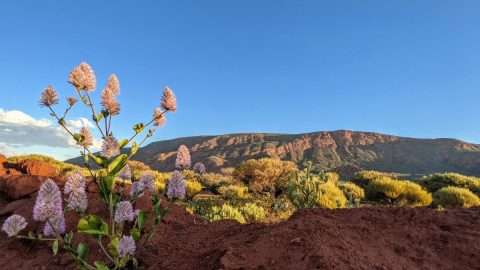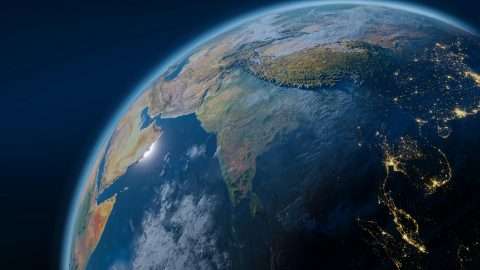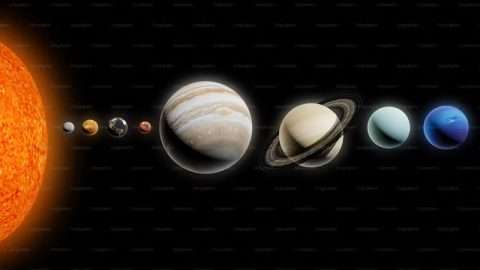I’ve been wrestling with a reverberating question. Can we talk about ‘climate change’, in a spirit of enquiry, rather than one of conviction?
Like many a thorny subject, conversations around climate change often produce more heat than light. And even if one is disposed towards listening and reading and observing, it can be difficult to sort the wheat from the chaff. Yet, if we are to have a decent conversation, some shift towards that separation needs to be made.

Credit NASA
My basic position has been that human activity, pretty much from the Industrial Revolution onwards, has had a significant impact on the Earth’s climate; an effect deemed ‘global warming’. Hitherto, the effect was negligible, at least as far as humans were responsible. The Sun did its thing; Nature ran its course. Temperature changes occurred; the planet warmed and cooled. ‘Ice Ages’ came and went, as did species of flora and fauna. But, over the past two centuries, humans altered the balance, resulting in higher atmospheric concentrations of carbon dioxide and other ‘greenhouse gases’ such as methane and nitrous oxide. We’ve done so through actions that, paradoxically, have also brought material wealth, greater food production, and the ability to commute and commune in ways that were once unthinkable. Such actions include the burning of fossil fuels, the clearing of forests for agriculture and human habitation, expansion of livestock for meat production, and the use of chemicals such as CFCs. Allied with these activities has been the growth in world population and the drift from villages and small towns to larger urban centres.
This basic position – which might be better described as a ‘level of understanding’ – didn’t arise out of thin air. No, I tried to make sense of the arguments advanced for and against, and reached a measure of acceptance that there was a broad consensus in the scientific community that global warming was real; that if unchecked it would have hugely detrimental consequences for the human race, and who was I to argue against the tide of that opinion? Moreover, my lived experience in an industrial/technologically-oriented society – within an economic paradigm based upon consumer-driven ‘growth’ – did not inspire any confidence that Homo sapiens was headed in the right direction. Under the questionable rubric of ‘progress’, we seem to be wrecking our planetary home.
Contemporaneously, I’ve thought to myself – what if they’re wrong? What if all the data has been misinterpreted, what if the modelling is fallacious, what if the scientists who have done so much to bring their concerns to the attention of politicians, journalists, academics, and more ordinary folk are simply intent on pushing their own barrows, without a semblance of uncertainty and without a willingness to question motives and methods? But my conclusion, for what it’s worth, is that while there might be some of scientific persuasion who are not necessarily pure of heart, the majority certainly are, and their warnings are not given lightly.
Not everyone is convinced. A quick search of the Internet reveals a plethora of opinion. As always, social media runs amok. In the mainstream, libraries and bookshops carry weighty tomes replete with scientific analyses, graphs and charts – and opposing viewpoints. Newspapers and journals contain articles where proponents of one claim or another endeavour to capture public attention. No wonder there is confusion writ large.
So, what do most of us do? Well, my best guess is that we either shy away from having an opinion, finding it all too hard – or we settle on one that makes some sort of sense, given what we might have absorbed and processed. I fall into the latter camp, while paying due respect to the complexity of climate issues, and attempting to take into account my personal predilections.
Others are convinced that contemporary climate science is wrongheaded and full of unproven claims. A decade and a half ago, Professor Ian Plimer of the University of Adelaide published Heaven+Earth, a pungent treatise that attempts to debunk climate change as a grave threat, minimises the effect of human input, and pours scorn on the intent and composition of the Intergovernmental Panel on Climate Change (IPCC) as ‘an ascientific, political organisation’. Predictably, there was immediate pushback. Professor Barry Brook – then also Adelaide based – acknowledged that there are a lot of uncertainties in science, and it is ‘indeed likely that the current consensus on some points of climate science is wrong, or at least sufficiently uncertain that we don’t know anything much useful about processes or drivers’. Moreover, ‘some researchers have shown that the Earth has been hotter before, and that more CO2 has been present in the atmosphere in past ages’. While this is ‘entirely uncontroversial’, what is now relevant is ‘the rate of climate change, the specific causes, and its impact on modern civilisation that is dependent, for agricultural and societal security, upon a relatively stable climate.’
In the wider world, media coverage is often unsubtle. Australia’s national newspaper, despite Rupert Murdoch’s avowed conversion, has pumped out a litany of scepticism, involving a coterie of contributors, of whom Plimer is one. On the other side of the debate, our ABC and the Fairfax/Nine Press are hammer and tongs in the other direction. Clearly, as with individuals and organisations in all walks of life, social and economic ideologies along with vested interests, play an important part in how our beliefs around climate change are formed and often calcify.
Yet these beliefs, and the forces that shape them, are rarely acknowledged, upfront. With public figures, we may be able to deduce their leanings from their occupations and affiliations. By way of example, Plimer’s non-academic background is that of mining geologist and director in mining companies. Brook is a professor of sustainability. Those allegiances are by no means conclusive. If true science is brought to bear, the bearer’s other hats should not be relevant. Research should be dispassionate, using tried and true modus operandi rather than preconceived outcomes. And it is perhaps here that much of the debate around climate change gets muddied.
The mud obscures, and can blind a scientist, as much as it might consume a poor layperson struggling to reach an informed understanding. More than that, in an effort to sort the wheat from the chaff, there can be an impulse to choose a point of view that suits our case; an instance of what’s called confirmation bias. Unconscious processes may be at work. Perhaps we are idealistic and want a better world than the one that we find ourselves in. We embrace concepts like ‘sustainability’ and invest in companies that seem to embrace values similar to ours. On the flipside, we may worry that environmental activism will see the lights go out. This induces us to hold shares in mining companies and rationalise that wealth production and energy needs at this stage of human development are inextricably tied in with digging holes in the ground and drilling into the seabed. Presented with difficult choices, we juggle a set of values that may or may not accord with our self-interest.
What then are the chances we can bring a measure of individual and collective clarity to any discussion around climate change and its impacts? Not great, one would think, looking at how humans have handled differences of opinion down the centuries. But I would venture a starting point would be some kind of recognition that we do not live in isolation from one another although, physically speaking, it may appear to the contrary. At the beginning of Covid, the slogan ‘we’re all in this together’ had an impact (before it was forgotten and the acrimony set in). Again, when early astronauts looked down from space at our little blue planet, there was instant recognition of its beauty, uniqueness, and that it represented ‘One Earth’, despite the shenanigans carried out by the human component. For a moment, a brief moment, there was a glimpse of global solidarity and inspiration. In a complex world, there are no easy answers.

As David Orr points out in his book, Dangerous Years: ‘As humans spread over the earth, we fractured ourselves by ethnicity, culture, history, religion, wealth, nationality, and ideology. As a result we often fail to see our various journeys as parts of a single evolving enterprise.’
I share Orr’s lament. And I agree with him that, for the most part, we are fast thinkers but slow learners who ‘have difficulty understanding exponential growth and the interconnectedness of things’. Much as we might talk about leaving a better future for our kids and grandchildren and those that come after them, we ‘tend to flounder when contemplating the long-term’. Often, though our hearts might be in the right place, there is a sense of inertia and despair. And, though it’s easy to forget when one lives in an affluent society, the vast majority of people are just trying to make ends meet and survive. Hunger, war, discrimination, and persecution are rife. On top of this, climate events tend to impact disproportionately on those who, through geography and a lack of means, are literally and metaphorically in ‘the eye of the storm’.
An old friend is fond of saying ‘don’t panic’. In this, I think he is wise. Yes, panic simply adds a debilitating layer to muddled-headedness and existential angst. Yet a ‘calm-down’ caution can also negate a sense of urgency, and obscure a latent propensity towards a ‘she’ll be right’ mentality; a brand of Ocker optimism founded more upon poetic license than reality. Such an attitude might incubate among old codgers of my vintage but provides little succour to those who come after us. Increasingly, their crystal balls do not reveal a bright future and, like the young everywhere, they are moved to action rather than armchair pontificating.
Others, no matter what age, lose hope or tune out in one way or another. On occasions I’ve felt the temptation. Reality can suck. Global warming is a great example. We can set political targets to reduce emissions, without any great confidence they will be met. We can embrace renewables such as wind and solar, knowing full well they cannot replace fossil fuels overnight or even within the foreseeable future. We can champion an electrified bonanza and ignore the realities of rare earth extraction and battery production. We can moan about over-consumption but who amongst us is prepared to relinquish or reduce our standard of living to ‘save the planet’? Yet, if we look the world in the eye, and embrace reality for what it is, with many challenges that appear intractable, perhaps that is a foundation for hope. David Orr points to this when he eloquently expresses what lies ahead:
From a systems perspective, the challenge of sustaining civilisation requires calibrating – and recalibrating, in perpetuity – the energy, water, and material consumption as well as the ecological effects of seven and soon perhaps eleven billion inhabitants given the complex realities of ecology, thermodynamics, the biogeochemical cycles of the Earth, and ethics on a planetary scale. The transition goes beyond simply improving our technology, although deployment of better technology will be necessary. It will require developing and sustaining the extraordinary clarity, foresight, and wisdom needed to make corresponding changes in governance, politics, economy, and culture. None of this will be possible without a softening of the more violent and reptilian aspects of human psychology and behaviour, which in turn will require a deeper understanding of our nature and evolution.
Those words ring deep and true. They reflect the spirit of enquiry, to which I alluded earlier, as well as the spirit of collaboration. And, at their heart, they offer a possibility that the disparate agglomerations of humans who inhabit the Earth may one day earn their Humanity.
By Bruce Menzies. Based in Fremantle, most of the time, Bruce Menzies is the author of three novels, a family history, and a recent memoir. Details at BruceJamesMenzies.com If you’d like to read more of Bruce Menzies’ work on Fremantle Shipping News or listen to a fascinating podcast interview with Bruce, look here
~~~~~~~~~~~~~~~~~~~~~~~~~~~~~~~~~~~~~~~~
* If you’d like to COMMENT on this or any of our stories, don’t hesitate to email our Editor.
** WHILE YOU’RE HERE –
PLEASE HELP US TO GROW FREMANTLE SHIPPING NEWS
FSN is a reader-supported, volunteer-assisted online magazine all about Fremantle. Thanks for helping to keep FSN keeping on!
*** Don’t forget to SUBSCRIBE to receive your free copy of The Weekly Edition of the Shipping News each Friday!
****AND Shipees, here’s how to ORDER YOUR FSN MERCH. Fabulous Tees with great options now available!







